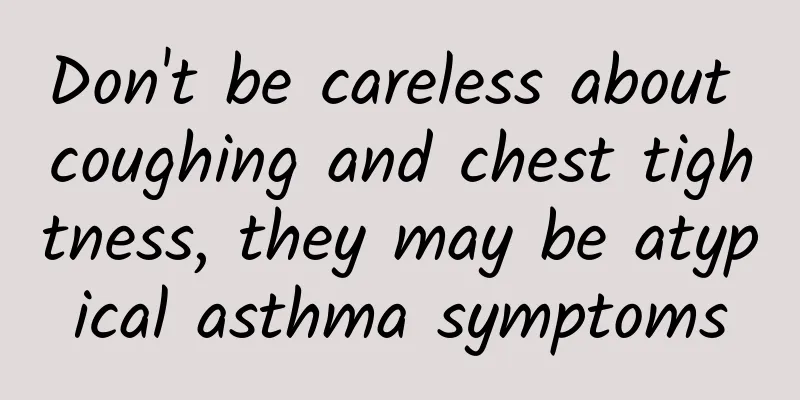Is it menopause if a woman does not have her period at the age of 46?

|
If a 46-year-old woman does not have her period, but does not have an IUD for contraception and does not use any other contraceptive methods, the first thing to consider is the possibility of pregnancy. If you are not pregnant, then you need to consider it as a manifestation of menopause. However, some women may also experience menarche three months after amenorrhea. The main consideration is that the uterine and ovarian endocrine nerve dysfunction leads to menstrual disorders caused by the absence of ovulation. However, since it is menopause, it is also a normal manifestation. In clinical medicine, menopausal syndrome refers to the physical and mental abnormalities caused by decreased estrogen metabolism, decreased estrogen secretion, or fluctuations in estrogen secretion in women before and after menopause. The main symptoms are mood swings, depression, irritability, or night sweats, hot flashes, fatigue, and lack of energy to do anything. Menopausal syndrome can be divided into natural menopause, which refers to the gradual decline of ovarian function, and after the decline, menstruation stops. Artificial menopause is caused by the cessation of menstruation due to tumor radiotherapy or some other reasons, such as the surgical removal of the uterus and ovaries, which reduces female hormones. Drug treatment. 1. Under normal circumstances, HRT (growth hormone replacement therapy) should have the overall goal of maintaining the body's physical and mental health. Long-term medication is required to prevent postmenopausal degenerative diseases. (1) Etiological treatment: During the growth period, women's blood undergoes regular changes in estrogen and progesterone, which participate in coordinating the body's physiological activities and become the key factors in stabilizing the extracellular fluid of women and maintaining physical and mental health. After menopause, due to the continuous decline of estrogen and progesterone, the female body and mind are unbalanced, and the body undergoes a series of degenerative changes, resulting in poor physical condition for some women. Provide etiological treatment for these health problems caused by estrogen deficiency. (2) Physiological supplementation: The purpose is to enable the internal organs of postmenopausal women to function physiologically as much as possible to maintain the body's physical and mental health, rather than to restore their endocrine conditions to the level of the ovarian cycle during the growth period, that is, physiological supplementation. Physiological supplementation is mostly believed to use natural estrogens, which have the chemical structures of estrone, estradiol and estriol. The dosage should be controlled so that the blood E2 concentration is around 220pmol/L, or within the very estrogen-specific range, and should not exceed 550pmol/L. Exceeding this level may lead to an increase in side effects, because the amount of estrogen and progesterone used in emergency contraception is large, the specificity is strong, and the chemical structure is non-physiological, which is not suitable for physiological supplementation in HRT. (3) During the menopausal buffer period, HRT should be dominated by estrogen supplementation: During the menopausal buffer period, the barrier to egg development gradually increases, and eventually the functional eggs disappear from the uterus and ovaries. The relative estrogen and oestrogen changes during this period are: first there is a relative deficiency of estrogen, then deficiency; the lack of estrogen changes regularly, although there may be a transient relative excess, the total output gradually decreases, and finally to deficiency, resulting in a relatively excessive or single unresistance estrogen stimulation for a long time, some women may have varying degrees of proliferative changes in the uterine wall, and even deterioration. Therefore, during this period, regular estrogen supplementation is necessary to regulate the physiological cycle and prevent endometrial hyperplasia and space-occupying lesions. As estrogen gradually becomes deficient, estrogen can be supplemented. |
<<: Can women with amenorrhea still get pregnant?
>>: Can a woman still have a baby at 45?
Recommend
An American reporter said that China stole vaccine technology. Why did Hua Chunying laugh?
A US reporter said that China stole vaccine techn...
Five-minute quick menstruation method
Menstruation is an inseparable existence for fema...
Hyperprolactinemia in women
Hyperprolactinemia is actually not very familiar ...
Is morning sickness retching or real vomiting?
During pregnancy, the most uncomfortable thing fo...
Three months pregnant, there is blood in the toilet
Bleeding problems in any situation are a problem ...
Use dental floss well - do a thorough cleaning of the gaps between teeth
Author: Liu Zifei, Wang Yahuan, Wang Cong School:...
How long can autumn pear paste be stored? How to store autumn pear paste
Autumn and winter are prone to dryness, and babie...
When is the time for ultrasound examination during pregnancy?
During the ten months of pregnancy, women should ...
What is the thickness of the endometrium during ovulation?
It is a normal body reaction for women when they ...
What are the side effects of drinking coconut water during pregnancy?
Coconut shoes are a fresh tropical fruit native t...
Can I drink Astragalus and Wolfberry water during menstruation?
Scutellaria baicalensis is called "little gi...
Long delayed menstruation
Why is the menstrual period not clean for a long ...
What should I do to prepare for pregnancy?
There are many preparations to be made in prepara...
Do you need to peel the dried persimmons when making them? Why do you need to peel the dried persimmons when making them?
We all know that dried persimmons are made from f...
What are some tips for women’s health?
I believe that "health preservation" mu...









